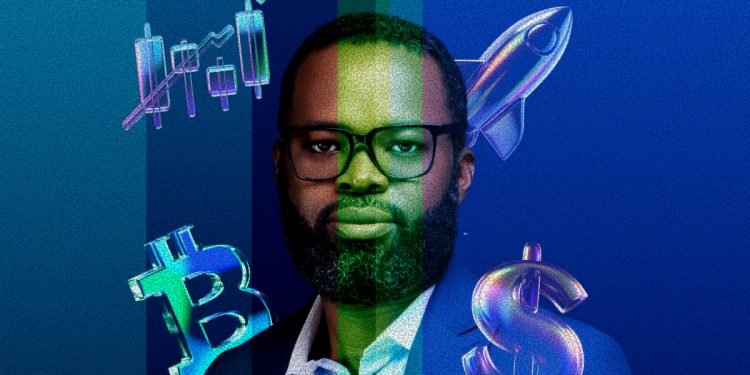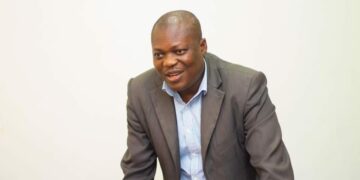“We Don’t Need Aid, We Need Trust” – Inside Aya’s $7M Bet on African Web3 Builders
In Ghana, where Eric Annan grew up, the internet always felt full of promise. He didn’t learn to code or build websites. What he did do was ask questions—about who gets access, and why so many in Africa are left out. That curiosity pulled him into digital spaces, where by his early twenties, he was launching initiatives, building cross-border networks, and laying the groundwork for systems of his own.
Then, in 2015, he tried to use PayPal.
The transaction didn’t go through.
“I thought maybe I did something wrong,” he remembers. “But then I realised, this wasn’t a bug. I was just blocked. Because of where I’m from.”
It was the kind of rejection that didn’t come with a warning or explanation. One minute you’re a digital native; the next, you’re reminded you’re on the wrong side of the border. Not physically, but financially.
“I was economically disenfranchised,” he says. “There were tools that were shaping the world, and I couldn’t even access them.”
That experience didn’t just frustrate him; it clarified something. The very internet that promised global opportunity still mirrored old power dynamics. And in Annan’s case, it set him on a course to ask: What would it take to build systems that include people by default, not exception?
That question stayed with him. Years later, it became the foundation for Aya HQ, a Techstars-backed startup studio that has trained over 300 Web3 talents, incubated 50+ projects across 30 countries, and partnered with global players like Coinbase and Lisk.
To see how he got there, we had to trace the moments that shaped his thinking.
Trust as currency
Annan did what many coders do when they hit a wall: build something small, scrappy and close to the ground.
That ‘something’ was Digital Kudi, launched in 2017 while now living in Abuja, Nigeria. Long before BuyCoins or Quidax entered the scene, and while players like Luno were scaling digital apps, Digital Kudi was doing something different—facilitating peer-to-peer crypto trades rooted in offline trust.
“We were doing P2P before it had a name,” Annan says. “People trusted us, not because of our tech stack, but because we showed up.”
It worked. And it worked fast. For a while, Digital Kudi was a proof of concept: Crypto could be a tool to leap over the gates PayPal and others had locked.
Annan wasn’t the only one seeing the potential. Africa now has over 43 million crypto owners, with adoption growing faster here than anywhere else. In 2024, usage rose by 8.5%, making it the world’s fastest-growing region for on-chain activity.
West Africa drives most of that momentum, accounting for nearly 75% of the continent’s crypto interest. Nigeria alone ranks second globally in adoption and leads the world in peer-to-peer trading volume.
But scaling trust is harder than writing code. And as the market matured, so did the questions Annan was asking. It wasn’t just about payments anymore. It was about permission, and who had the right to build systems in the first place.
KuBitX and the cost of ambition
In 2018, riding the momentum from Digital Kudi, Annan teamed up with co-founders across three African countries—including Nigerian blockchain advocate Victor Akoma-Philips—to build KuBitX, a bold attempt at a regulated, pan-African crypto exchange.
They secured a partnership with Interswitch. Had the right logos on the pitch deck. For a moment, it looked like the dream might scale.
But by 2021, it had collapsed. Not from scandal or hacks, but from the slow unravelling that happens when ambition outpaces alignment.
“KuBitX failed,” Annan says plainly. “But the failure wasn’t about the product. It was about people. We weren’t ready to build together. Everyone had ideas, but not enough of us had practice being vulnerable, collaborative, accountable.”
It was a hard landing. One that left Annan watching much of the team scatter across the ecosystem, quietly absorbed into other projects like Victor, who would later go on to co-found the Bantu Blockchain Foundation, while others drifted away altogether.
He could’ve done the same. Instead, he paused.
And started listening.
The real bottleneck was the human factor
In the months after KuBitX folded, Annan spent time talking to developers, designers, and early-stage founders across the continent. The tools were there. So was the talent. But something else kept stalling progress.
“People knew how to code,” he says. “But they didn’t always know how to lead. Or communicate. Or navigate uncertainty.”
It wasn’t a technical gap. It was a human one—and it rarely showed up in portfolios or GitHub profiles.
That became the realisation behind Aya’s first iteration. It wasn’t an incubator yet. It began as a talent platform, built to connect Africa’s Web3 engineers to global work.
But the matches didn’t hold. Projects fizzled out. Hires dropped off. It became clear the problem went deeper.
So they changed course. Aya started training, not just in code, but in product thinking, storytelling, and collaboration—the skills Annan now calls “the human layer.” A layer he believes many of Africa’s brightest ideas still struggle to build on.
When building teams, the real metric is mindset
Today, Aya HQ trains and incubates early-stage founders across Africa—but its structure is shaped by those hard-earned lessons.
Each cohort brings together smart contract developers, product designers, and product managers in a bid to form functional teams.
“We reverse-engineered the MVP team,” Annan says. “Three people who graduate from our programme can realistically launch something together.”
Aya is building what Annan calls audacity: the mindset to try, fail, learn, and keep building.
Since adopting this model, Aya has trained over 300 talents, supported 50+ projects across 30 countries, and watched startups from its network raise nearly $1 million in early-stage funding.
But the real metric is mindset.
“The real success is seeing people take ownership of their ideas,” Annan says. “Watching someone go from ‘I’m just a dev’ to ‘I can be a founder.’ That shift—that’s the product.”
A trust-first model for a borderless future
Aya may have started in Africa, but its philosophy reaches further. Through co-living residencies, corporate hackathons, and community-driven product design, it’s exploring new ways to build across borders.
Take muAccra, a recent two-week pop-up in Ghana that brought together 120 participants from five countries. The outcome wasn’t just prototypes—it was a framework for sustained collaboration.
That same thinking shapes how Aya supports startups. Instead of writing checks or taking 10% equity, Aya partners with funders like Lisk, takes a modest 2 to 3 percent, and stays embedded with the teams it backs.
“We want to be the trust layer,” Annan says. “For global investors looking into Africa, we do the groundwork. We grow with the teams.”
Now raising a $7 million fund—with $2 million set aside for team operations—Aya is looking to scale that model, expanding its hubs, backing more builders, and deepening its support across the continent. The mission stays the same: invest in trust, stay close to talent, and build systems that don’t rely on permission.








